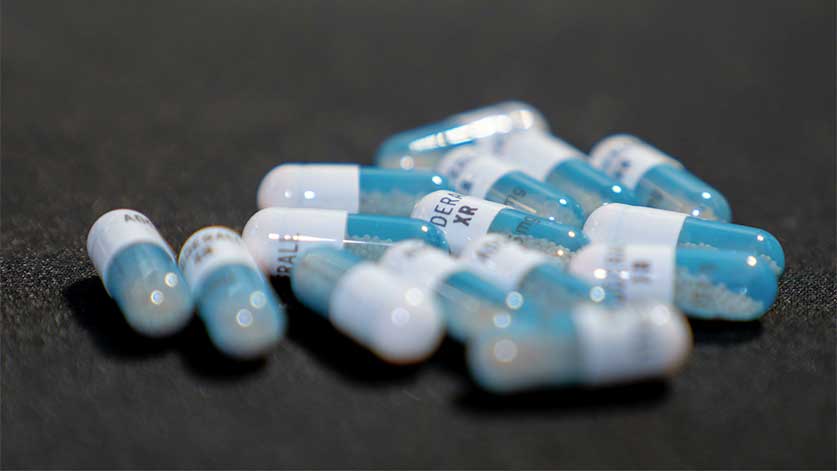Adderall Side Effects | Common, Severe, & Long-Term
Adderall is a stimulant drug that comes with various side effects. These effects can be mild like dry mouth or they can be more serious and lead to heart problems and mental health issues.

Adderall/Adderall XR is the brand name for the combination of amphetamine and dextroamphetamine. It’s a central nervous system (CNS) stimulant medication that’s used to treat attention deficit hyperactivity disorder (ADHD) as well as sleep disorders like narcolepsy.
Adderall works by increasing the neurotransmitters dopamine and norepinephrine in the brain which helps increase the ability to pay attention, decreases impulsivity, and help those with narcolepsy stay awake during the day.
Unfortunately, the drug also comes with quite a few side effects. Some are common and on the milder side while others are severe and can be long-term.
Common Side Effects Of Adderall
A lot of the side effects that Adderall can lead to are pretty common and occur in many of the people who use the medication.
Some of the most common side effects include:
- loss of appetite
- dry mouth
- trouble sleeping
- headache
- stomach pain
- constipation
- nausea
- weight loss
- anxiety
- dizziness
- changes in sex drive or ability
- painful menstrual cramps
- diarrhea
Severe Adderall Side Effects
While not as common, Adderall can lead to several severe side effects as well. If you experience any serious side effects, you may need to call your healthcare provider. They will likely reduce your dose or put you on a different medication.
Severe side effects may include:
- heart problems like high blood pressure, rapid heartbeat, chest pain, heart attack, numbness in the arm or leg, and stroke
- depression and/or mania (bipolar disorder)
- hallucinations
- impaired or delusional thinking
- aggressive behavior
- seizures
- blurred vision
- severe allergic reaction
- rhabdomyolysis (muscle breakdown)
- motor/verbal tics or uncontrolled movements
- severe headaches
- shortness of breath
Long-Term Adderall Side Effects
Using Adderall can also lead to long-term side effects. These effects can occur when the drug is mixed with other medications, when it’s abused, or even when it’s taken as prescribed.
Mental Health Issues
Mental health issues and psychosis are just a few of the long-term side effects that can occur with Adderall use. These effects can either worsen already existing psychosis or bring about new issues. This seems to be especially the case when Adderall is taken with methylphenidate (Ritalin).
Mental health side effects can include hallucinations, delusional thinking, manic episodes, depression, suicidal thoughts, panic attacks, severe anxiety, aggression, and paranoia.
If these symptoms occur, let a healthcare professional know. They will likely recommend that you stop taking Adderall.
Serotonin Syndrome
Serotonin syndrome can be another long-term side effect of Adderall but this likely only occurs due to an Adderall drug interaction with antidepressants or CYP2D6 inhibitors like paroxetine, fluoxetine, and ritonavir.
The symptoms of serotonin syndrome include hallucinations, delirium, agitation, heart arrhythmia, vomiting, dizziness, seizures, nausea, and tremors.
Overdose
Taking higher than recommended doses of Adderall and/or abusing the prescription drug can significantly increase your risk of overdose.
The signs and symptoms of an Adderall overdose can include:
- rapid breathing
- restlessness
- hallucinations
- tremors
- changes in blood pressure
- rapid heart rate
- nausea and vomiting
- seizures
- loss of consciousness
- coma
Heart Problems
Since the use of Adderall can increase heart rate and blood pressure, it can also cause serious cardiovascular issues.
This can include hypertension, arrhythmias, heart attack, stroke, heart disease, and even sudden death, especially in those who have pre-existing heart problems before they start taking Adderall.
Heart problems become even more of an issue if you’re taking Adderall with an MAOI like linezolid, isocarboxazid, phenelzine, selegiline, or tranylcypromine. The mixture can lead to stroke, heart attack, or death.
Addiction
Since Adderall is classified as a Schedule II controlled substance by the Drug Enforcement Administration (DEA) and the Food and Drug Administration (FDA), it has a high potential for abuse and can lead to physical dependence and addiction.
After you’ve built up a dependence on Adderall, you may experience withdrawal symptoms when you stop using it. This can lead to continued Adderall abuse and eventually addiction.
Some of the signs of Adderall abuse and addiction can include:
- over talkativeness
- nervousness, anxiety, and panic
- doctor shopping
- crushing and snorting or the immediate-release or extended-release versions of the drug
- spending a significant amount of time and money on obtaining more Adderall
- neglecting responsibilities at home, work, or school
- continuing to take the prescription medication despite negative consequences
If you or a loved one is struggling with drug abuse, please contact Ohio Recovery Center to learn how we can help.
- Drug Enforcement Administration: Diversion Control Division — Definition of Controlled Substance Schedules https://www.deadiversion.usdoj.gov/schedules/
- National Institute on Drug Abuse — Prescription Stimulants DrugFacts https://nida.nih.gov/publications/drugfacts/prescription-stimulants
- National Library of Medicine: MedlinePlus — Dextroamphetamine and Amphetamine https://medlineplus.gov/druginfo/meds/a601234.html
- National Library of Medicine: StatPearls — Amphetamine https://www.ncbi.nlm.nih.gov/books/NBK556103/

